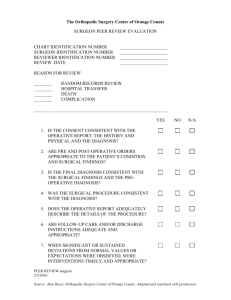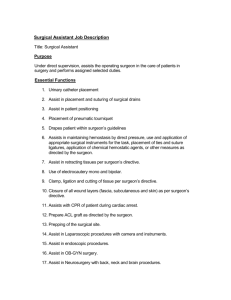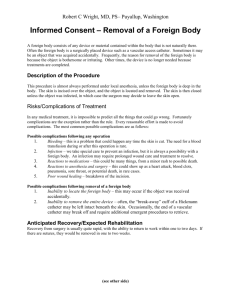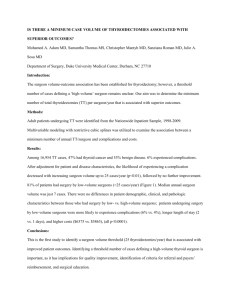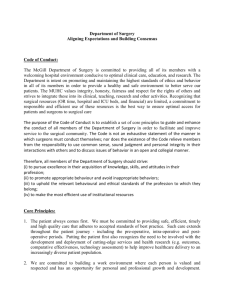Pancreatic Surgery Quality Metrics
advertisement
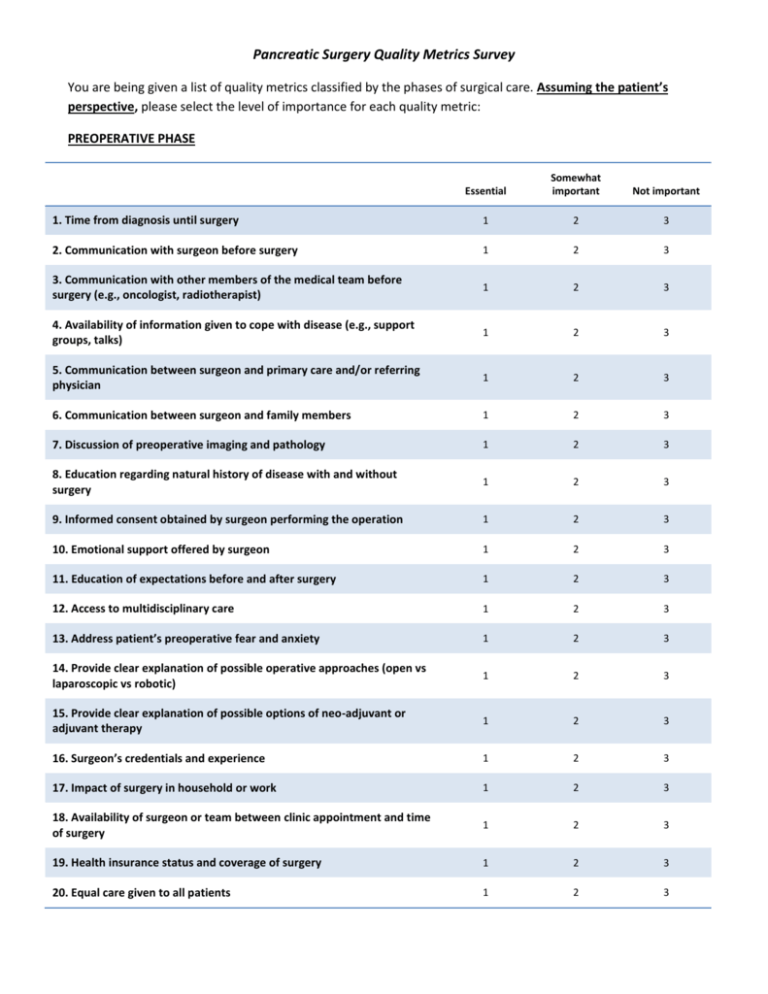
Pancreatic Surgery Quality Metrics Survey You are being given a list of quality metrics classified by the phases of surgical care. Assuming the patient’s perspective, please select the level of importance for each quality metric: PREOPERATIVE PHASE Essential Somewhat important Not important 1. Time from diagnosis until surgery 1 2 3 2. Communication with surgeon before surgery 1 2 3 3. Communication with other members of the medical team before surgery (e.g., oncologist, radiotherapist) 1 2 3 4. Availability of information given to cope with disease (e.g., support groups, talks) 1 2 3 5. Communication between surgeon and primary care and/or referring physician 1 2 3 6. Communication between surgeon and family members 1 2 3 7. Discussion of preoperative imaging and pathology 1 2 3 8. Education regarding natural history of disease with and without surgery 1 2 3 9. Informed consent obtained by surgeon performing the operation 1 2 3 10. Emotional support offered by surgeon 1 2 3 11. Education of expectations before and after surgery 1 2 3 12. Access to multidisciplinary care 1 2 3 13. Address patient’s preoperative fear and anxiety 1 2 3 14. Provide clear explanation of possible operative approaches (open vs laparoscopic vs robotic) 1 2 3 15. Provide clear explanation of possible options of neo-adjuvant or adjuvant therapy 1 2 3 16. Surgeon’s credentials and experience 1 2 3 17. Impact of surgery in household or work 1 2 3 18. Availability of surgeon or team between clinic appointment and time of surgery 1 2 3 19. Health insurance status and coverage of surgery 1 2 3 20. Equal care given to all patients 1 2 3 INTRAOPERATIVE PHASE: Essential Somewhat important Not important 1. Communication with surgeon on the day of the operation 1 2 3 2. Use of preoperative anticoagulation to prevent development of blood clots 1 2 3 3. Use of preoperative antibiotics to prevent development of infections 1 2 3 4. Operative approach (e.g., open vs laparoscopic) 1 2 3 5. Development of intraoperative complications 1 2 3 6. Amount of blood loss during the procedure / need for blood transfusions 1 2 3 7. Participation of residents/fellows in the operating room 1 2 3 8. Deviation from original surgical plan (e.g., conversion to open) 1 2 3 9. Amount of drains placed during the procedure 1 2 3 10. Intraoperative mortality 1 2 3 11. Costs of the operation 1 2 3 12. Duration of the operation 1 2 3 13. Updates on patient’s condition to family during the operation 1 2 3 What better defines your role in the care of patients with pancreatic cancer? Attending Surgeon/Physician Resident/Fellow Nurse Patient Other: POSTOPERATIVE PHASE: Essential Somewhat important Not important 1. Communication of surgeon with family after surgery 1 2 3 2. Face-to-face time of surgeon with patient after surgery 1 2 3 3. Use of clinical pathway for recovery 1 2 3 4. Pain control 1 2 3 5. Development of postoperative complications 1 2 3 6. Total costs of care during length of stay 1 2 3 7. Length of stay 1 2 3 8. Postoperative mortality 1 2 3 9. Perception of quality of care by family members 1 2 3 10. Involvement of palliative/pastoral care 1 2 3 11. Involvement of social work/case management 1 2 3 12. Assistance with transition to home care 1 2 3 13. Readmission to the hospital (after being discharged) 1 2 3 14. Time of drain removal 1 2 3 15. Detailed explanation of discharge paperwork 1 2 3 16. Ease of access to my surgeon or surgical team after being discharged 1 2 3 17. Number of days until food ingestion 1 2 3 18. Measures to prevent postoperative complications 1 2 3 19. Time elapsed until I return to normal or close to normal activities 1 2 3 ARE WE MISSING ANY METRICS? No Yes:

